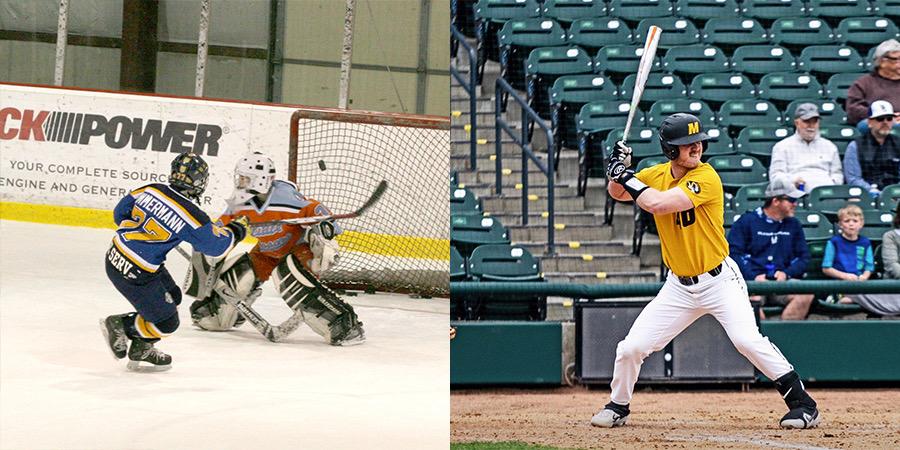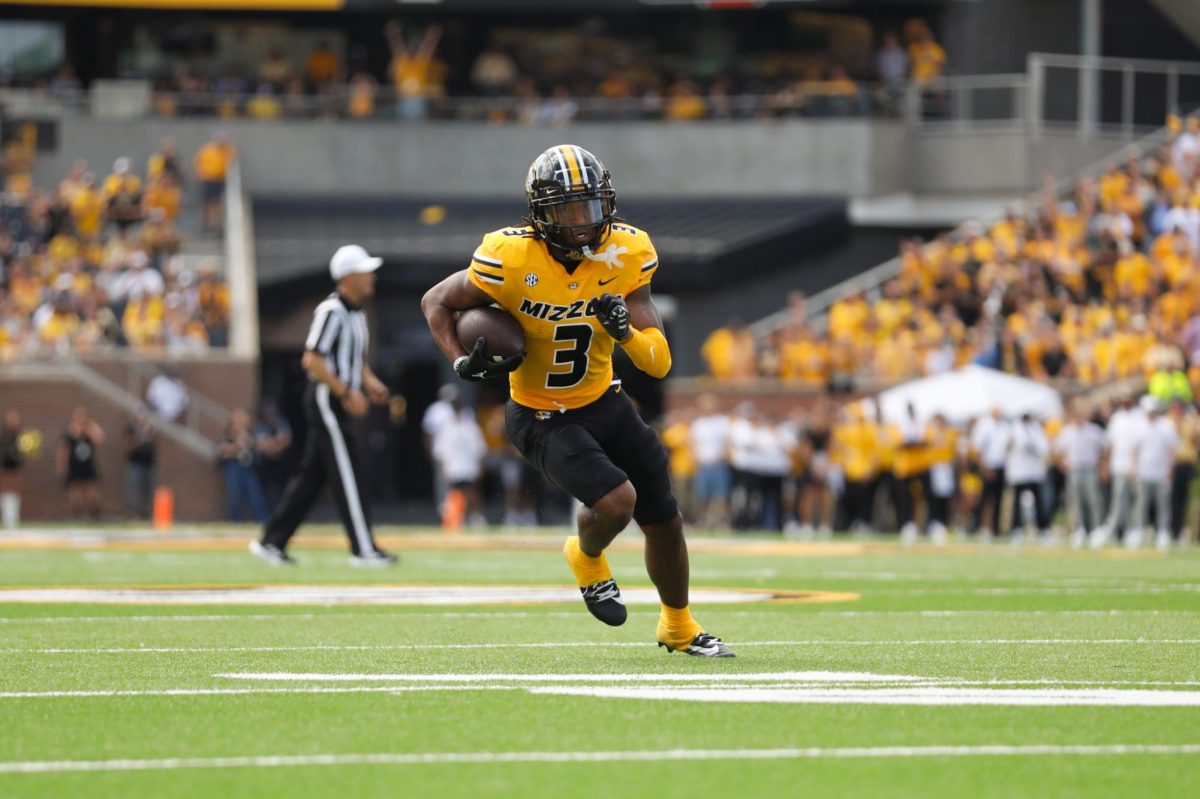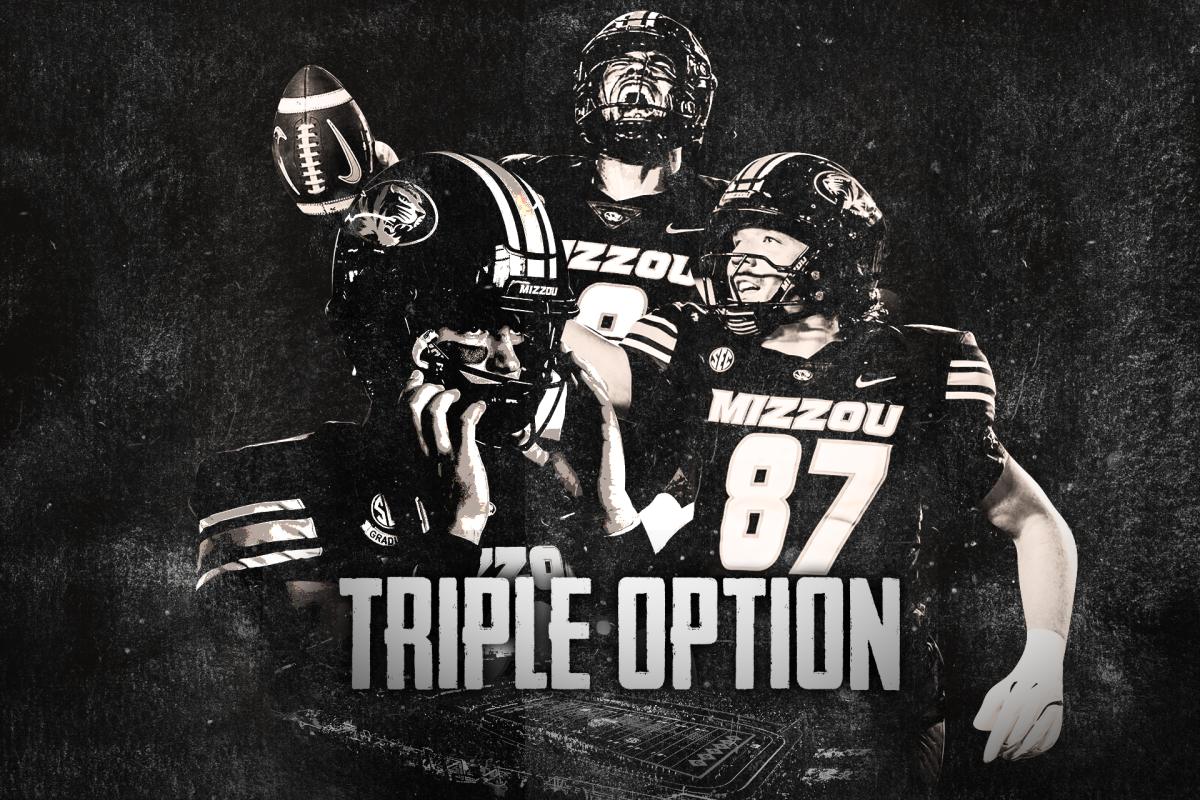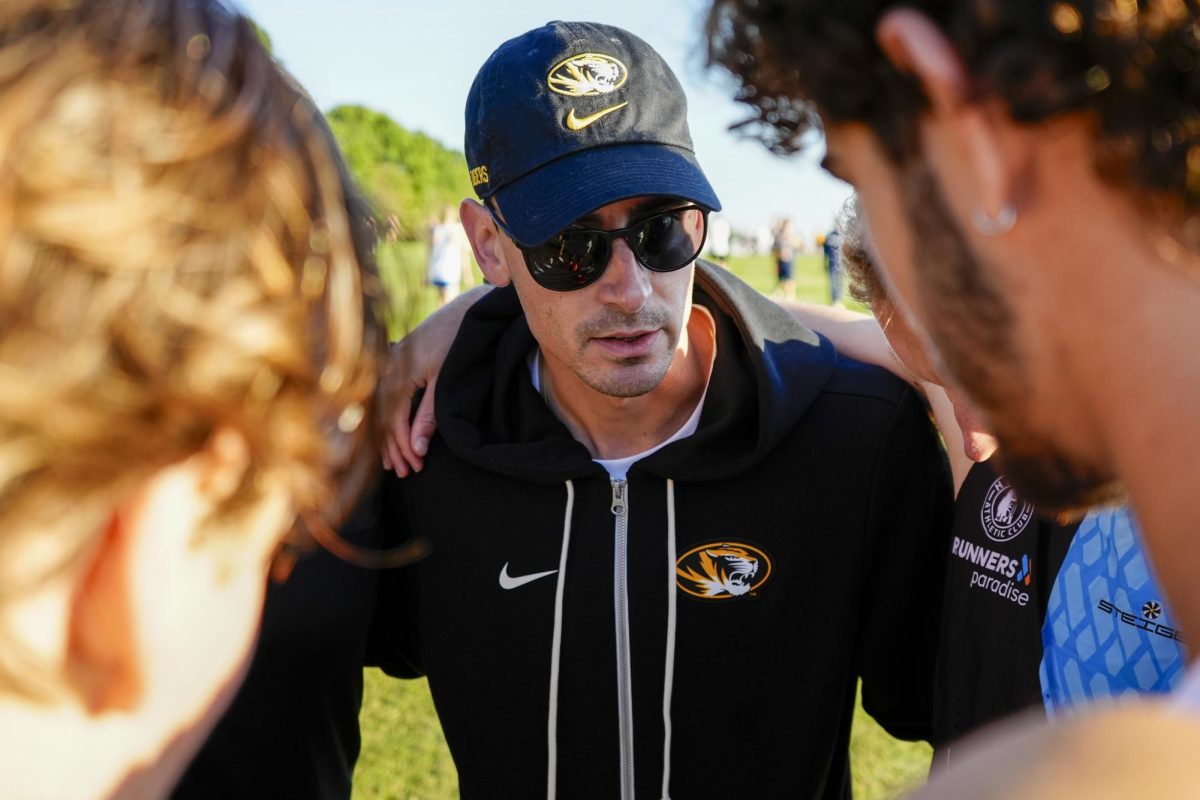Number 77, in a jersey almost identical to the NHL’s St. Louis Blues, picked up a rolling puck after it had been pushed into his defensive zone by a forward for the North York Rangers. They were a Triple-A 10U team (Triple-A is the highest level of North American youth hockey), not from the Empire State but hailing from a neighborhood near the northern coast of Lake Ontario — part of Toronto, Canada.
Toronto is hockey country. The game in question was the championship of a tournament in Detroit, Michigan — Hockeytown. And number 77, then-10-year-old defenseman Peter Zimmermann, now the starting designated hitter and top power threat on Missouri’s baseball team, was right in the middle of it.
Zimmermann skated around his own cage to the near side of the ice, ready to begin an attack. He coasted through the left circle toward the blue line, then faked right and stickhandled left, leaving a forechecking Ranger in his dust.
The D-man took one more stride toward center ice, looked up and saw number 21, forward Logan Brown, alone in front of a pinching defenseman. Brown received the pass directly on the tape, turning up ice with number seven, forward Matthew Tkachuk, with him in a two-on-one. The clip ends there, but the cameraman is confident that he knows what happened next.
“You’re on pretty safe ground assuming that they scored,” Ted Zimmermann, the senior DH’s father who shot the video, said.
Tkachuk and Brown probably did put the puck in the back of the net, seeing as both are now in the NHL. They, along with fellow St. Louis AAA Blues teammates Clayton Keller and Luke Kunin, were picked in the top 15 of the 2016 NHL draft. Not the top 15 rounds, the top 15 picks. They formed one of the more talented and successful youth hockey teams of all time, winning the aforementioned tournament in Detroit and many more.

_Zimmermann (77) and the AAA Blues stand at the blue line for the National Anthem. This image was used on NBC’s broadcast of the 2016 NHL Draft_ / Courtesy Ted Zimmermann
“We were literally a generational type team,” Zimmermann said. “It was unbelievable.”
“The memories I have are hanging out with the boys,” Brown said, “and just beating the s*** out of everybody.”
***
Zimmermann played hockey throughout his elementary and middle school career, up until seventh grade, and he displayed real talent from a young age.
“Hockey’s a game that, if you start early, and if you pick it up really well, the kid’s talent shows through pretty quickly, because it’s a hard game,” Ted Zimmermann said. “You have to skate, so you have an extension of your feet, and you have to play with an extension of your hands because you’ve got a stick.”
“But literally by the time he was six years old, he was one of the handful of kids in his organization that was at the top tier,” he continued. “He scored something like 50 goals in one year. It was pretty crazy.”
It wasn’t long before coaches in the area began to take note of the youngster’s abilities, including Jeff Brown, Logan’s father and a 13-year NHL veteran defenseman.
“I probably coached him for three or four years,” Brown, who holds the NHL Blues’ record for most goals scored in a single season by a defenseman, said. “He was a big, strong defenseman that was very, very reliable back there. Obviously we did have some pretty talented kids on that team but for sure Zim belonged and was a big part of those teams.”
“Zim was a great guy,” current Ottawa Senator Logan Brown said. He always was really competitive, and he hated to lose. You could tell that he’d get all ticked off if something didn’t go his way and he was one of the hardest workers on the team.”
Brown first coached Zimmermann when he played for St. Louis Elite Hockey, and he continued to do so throughout his first couple years on the St. Louis AAA Blues. Also coaching those teams — albeit on a part-time basis because he was still starring in the NHL at the time — was Keith Tkachuk, Matthew’s father and a USA Hockey Hall of Famer.

_Zimmermann with then-Blues star forward Kieth Tkachuk_ / Courtesy Ted Zimmermann
“[Brown] was just one of the smartest, most… like he was great at teaching us how to play hockey,” Zimmermann said. “Coach Brown would just drop the puck on the ice every once in a while and tell us, ‘Hey, go play pond hockey for an hour.’ Pretty much what happens is guys would just go out there and try whatever tricks they wanted with no consequences. I think that practice is what made these players so good.”
Brown’s tactics worked. Tkachuk, Keller, Brown and Kunin were drafted sixth, seventh, 11th and 15th in the 2016 draft, respectively. Tkachuk was an All-Star for the Calgary Flames in 2019 — in an All-Star game played in St. Louis — and Keller recently had his contract extended by the Arizona Coyotes to eight years, $57.2 million.
“He was a hard coach for sure,” Logan Brown said. “I think that all of us owe him something. He pushed us all a lot, and for me personally — and it sounds like Peter too — he taught us a lot. Not only in the game of hockey but in life.”
Ted Zimmermann noticed that, much like he had for Logan, Jeff Brown became a crucial role model in Peter’s life.
“One of the most influential people in his sports life was Jeff Brown,” he said. “I actually got to be a coach on that team, with Jeff, and I learned a lot from that guy. But in terms of the commitment, the passion and the ability to bring the best out of your teammates and players, Jeff had more influence on him than just about any other coach.”
“He was a real shy kid when I first got him, and we worked on trying to be a bigger part of the team as far as socially and that kind of thing,” Brown said. “Zim was very, very well-liked, and he just continued to develop that aspect.”

_The AAA Blues after winning the Little Caesars Tournament Championship in Detroit, Michigan_ / Courtesy Ted Zimmermann
The team, as Logan Brown alluded to earlier, was also wildly successful at the time. Among the tournaments they won was Pee Wee Quebec in Quebec City, Canada. It involved teams from all over the world including Russia, the Czech Republic and a New York superteam led by NHL legend Mark Messier.
“They brought the best kids from the entire state of New York onto one team,” Ted Zimmermann said. “They had a team that should have just destroyed anybody on the planet. Peter and his teammates beat them, I think the final was seven to two in front of 12,000 people up in Quebec.”
He was close. It was seven to one.
“It was one of the most remarkable things that I’ve ever seen.”

_Zimmermann fires a slap shot against the New York AAA Rangers_ / Courtesy Ted Zimmermann
The team traveled all over the country, including a trip to the home of the NHL Blues’ arch-rival.
“One of my favorite memories that I actually ever had was playing a team called Team Illinois,” Zimmermann said. “We played them at the United Center before a Blues-Blackhawks game and we actually got to play a full regulation game. Then we watched the Blues and Blackhawks play, which is always fun. People don’t realize how much we hate each other.”
Despite having chosen baseball over hockey heading into high school, Zimmermann is still invested in the careers of his former teammates and in the Blues, who remain the defending Stanley Cup Champions. Despite growing up a St. Louis Cardinals fan as well, his disregard for the Chicago Cubs never surpassed his contempt for the Chicago Blackhawks and the Detroit Red Wings.
“I never actually hated the Cubs, like you know they were the lovable losers; it was fun,” he said. “The only teams I ever hated were the Blackhawks, and I _hated_ the Red Wings. Oh my goodness.”
“We kind of bonded over that. I played hockey growing up too and we’ve had plenty of discussions,” said Zimmermann’s close friend and current teammate Lukas Veinbergs, a Missouri relief pitcher. “He teases me about the Red Wings all the time.”
***
Zimmermann moved away from hockey as he moved into high school, which has allowed him to focus on baseball and become a force at the plate. He and his dad will tell you that he would not be the player he is today, however, without his background in hockey.
“Hockey taught me a lot of lessons,” Zimmermann said. “You know, toughness, work ethic, attention to detail. And I had some of the greatest coaches.”
“Peter’s battled through some bumps and bruises, just like everybody, and he plays through it,” his father said. “That was one of the things that in terms of hockey, what his baseball coaches recognized about him was the grit and the perseverance that he brings. He just doesn’t let that stuff get in the way; he plays through it.”
This brings to mind a hockey tradition at the end of every playoff series: the injury list. NHL teams keep injuries very close to the vest, partly in fear of targeting. Once each team is eliminated, they release their players’ ailments to the public.
“You’ve watched hockey, you’ve seen the playoff hockey, you know what these guys put up with,” Ted Zimmerman continued. “And he’s not going to be deterred.”
Playing hockey, specifically on the defensive end, forced Zimmermann to learn how to read plays as they go along from a young age, which translates to baseball as well.
“It’s sort of like the quarterback on a football team,” Ted Zimmermann said. “You got the whole play in front of you, and you set everything up. And it’s sort of like the way he does it with baseball, how he reads pitchers, reads catchers. He did the same thing in hockey.”
Zimmermann would ask for access to game film during his hockey career in order to improve his craft. It would help him with his positioning in the defensive zone, or perhaps the placement of his feet when lining up his one-time slap shot. That’s a practice that he hasn’t forgotten.
“Peter’s still the same way; he’s still a student of the game,” Ted Zimmermann said. “After every game, it’s ‘Dad, send me the video. I wanna see where my hands were. I wanna see what my swing looked like.’ It’s a great teaching tool.”
***
Video from Zimmermann’s days playing hockey, as well as the photos used in this story, would not exist without Ted’s presence on the bench or in the bleachers. To this day, he remains an active voice on social media and a consistent occupant of Taylor Stadium seats.
“Ted was unbelievable,” Jeff Brown said. “He was our manager, he was his biggest fan. Zim was one of those dads who was always supportive, not only his son but the whole team and the coaching staff.”

_Ted Zimmermann (center) watches as former Blues defenseman Jeff Brown (right) coaches his son during a game_ / Courtesy Zimmermann Family
“My dad videotaped all our games on his old camcorder for highlight videos and stuff like that, and everybody loved it,” Zimmermann said. “My dad’s a special guy. I can never pay him enough for what he’s done.”
Ted Zimmermann has remained in the stands with a camera throughout his son’s career at Missouri, and he was there to help him navigate an up-and-down season in 2020.
Zimmermann began the year by watching his team’s postseason shatter after the NCAA denied Missouri’s appeal of their three-sport postseason ban. He spent the year as the Tigers’ leader in home runs and isolated power, mashing a walk-off double against Oklahoma and a mammoth home run with a bat flip against Texas that drew Albert Pujols comparisons from announcers. And he ended the year seated at Midway Airport in Chicago, having learned that COVID-19 officially stopped the sports world in its tracks.
“When the season got called, I said, ‘You’ll always have that,’” Ted said, referring to his accomplishments in 2020. “And ‘that’s gonna be special for the rest of your life.’ And we were all really proud of him.”
The pandemic did not end Zimmermann’s college baseball career, however. The NCAA granted an extra year of eligibility to spring athletes in March, prompting the senior to tweet a GIF that depicted Leonardo DiCaprio in “The Wolf of Wall Street” yelling, “The show goes on.” Missouri baseball later confirmed on Twitter that both Zimmermann and Veinbergs intend to return unless either are selected in the upcoming MLB draft.
“We took a huge step this past season and we’re just getting better,” Zimmermann said. “This past year is showing that people are starting to take a real interest in baseball here. We’re gonna put a good product on the field, we’re gonna win a lot of games, and I think we’re gonna break through.”
“I think the ceiling’s pretty darn high,” Veinbergs said.
While the Tigers may be confident about next season, they may still be at the mercy of the NCAA. Nothing has been reported, but some have speculated that the postseason ban may carry over into 2021, given that there was no postseason for Missouri to miss.
However, Zimmermann seems okay with that prospective reality. Perhaps that’s the hockey player in him — save for the occasional F-bomb at a skater in a striped shirt, they tend not to complain about outside circumstances.
“It’s a blast to go out there and play spoilers sometimes, and it’s fun to be the underdog; the blue-collar, annoying person sometimes,” Zimmermann said. “Obviously, I wish we could play in the postseason, but this past season showed me that I don’t need to have the postseason to still want to go out there and win every game and play with all my heart and leave it on the field.”
“That’s terrible and it hurts, but you can still go make somebody else’s year suck.”
_Edited by Eli Hoff | [email protected]_











